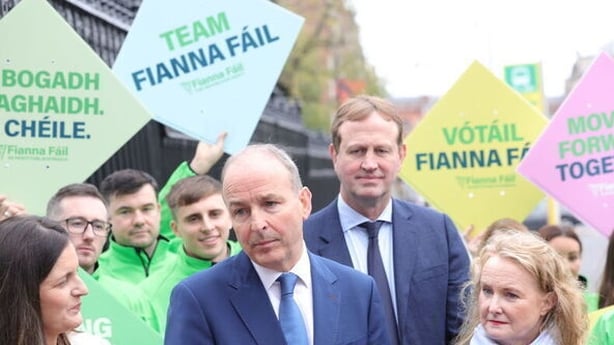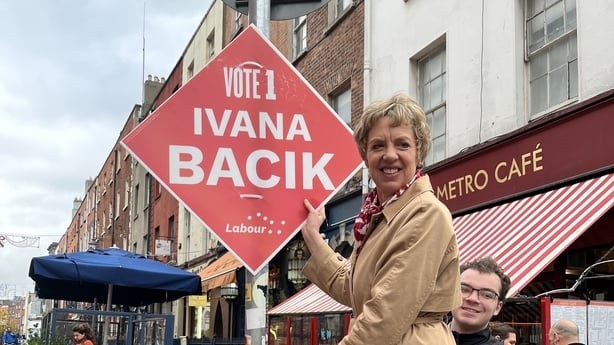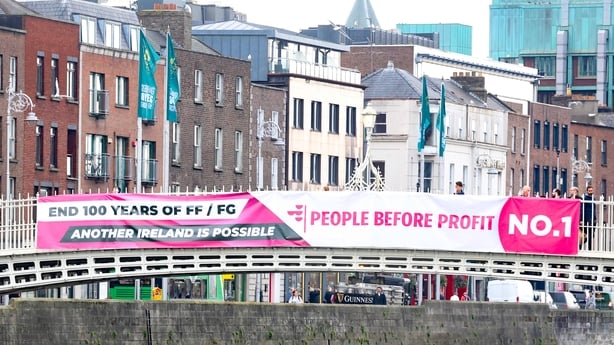Political parties have hit the campaign trail running on the first day of General Election 2024 which will end in three weeks time when voters are asked to give their views on Friday 29 November.
A number of political leaders' first day of campaigning ended with a trip to the Aviva Stadium to watch the Ireland versus New Zealand rugby test match, with parties hoping to side-step awkward tackles, avoid the political scrum and get over the try line to win some early public support.
The day of campaigning began in more official surroundings, with Fine Gael leader Simon Harris flying back from an EU Council meeting in Hungary to confirm he was seeking a general election to take place on Friday 29 November.
After months of intense speculation, Mr Harris gave a speech at Government Buildings shortly before 2pm on Friday, telling the public "the time is now right to ask the Irish people to give a new mandate".
The Fine Gael leader confirmed he wanted a 22-day race, with election day taking place on Friday 29 November, saying: "I ask one thing: value your vote, use your voice. If you give me your trust, I will give you my all."
Mr Harris thanked his party colleagues as well as coalition partners Fianna Fáil and the Green Party, before travelling to Áras an Uachtaráin in the Phoenix Park to ask President Michael D Higgins to dissolve the Dáil shortly before 2pm.
The President subsequently agreed to the Constitutional requirement, formally dissolving the Dáil and beginning the general election itself and clearing the way for general election 2024 to begin.
Mr Harris then travelled to the nearby Dublin West constituency where he canvassed alongside local candidates and former taoiseach and Fine Gael leader Leo Varadkar, who is not contesting this general election.
Pets, mince pies, popping into shops and meeting people. Simon Harris continues his first day of canvassing in Lucan in Dublin Mid West @rtenews pic.twitter.com/n3LDjRZjrE
— Samantha Libreri (@SamanthaLibreri) November 8, 2024
Fianna Fáil leader Micheál Martin had already started his party's campaign, telling reporters alongside a number of party candidates outside Leinster House that he believes leadership and experience is needed to navigate the next challenging five years.
Mr Martin predicted that housing and the cost of living will be among the big issues in this election, and ruled out forming a government with Sinn Féin afterwards.

Outside Government Buildings, Sinn Féin also began its General Election 2024 campaign, with party leader Mary Lou McDonald saying: "If Sinn Féin wins, you win. Your family wins, your future wins."
Ms McDonald promised voters affordable housing, a €10 daily cap on childcare costs and to abolish the Universal Social Charge.
She said she will not "insult" voters by ruling out any party in a potential coalition, but said her intention is to remove Fine Gael and Fianna Fáil from office.

Among other parties out today was the Labour Party, which opted to go for a policy launch rather than campaign launch, with its party leader Ivana Bacik focusing on the housing crisis and promising to address it if elected.
People Before Profit-Solidarity unfurled a banner across Dublin City's iconic Ha'penny Bridge, with PBP-Solidarity leader Richard Boyd Barrett saying voters are ready to change because that change is so badly needed and that in his view 100 years of Fine Gael and Fianna Fáil in power has been too long.
The Social Democrats leader Holly Cairns issued a statement saying the outgoing coalition failed far too many people, adding her party wants to go into government and drive the change that is needed.
All other parties and groups were also active on social media and in individual constituencies today.

They included Green Party leader Roderic O'Gorman who canvassed voters at Clonsilla Train Station this morning and his party, which after yesterday’s unofficial campaign launch at Leinster House, took to social media to remind people to register to vote.
Aontú said on social media that it was "the only opposition" in the last Dáil, while independent candidates and smaller parties also took to the campaign trail.
With a 22-day campaign now upon us, voters have until Friday 29 November to decide who they want to return to Leinster House.
Read more:
Resignations and restrictions - what were the challenges faced by outgoing Govt?
Latest Election 24 stories
Deadline for candidates to declare is confirmed
Every person who is an Irish or British citizen and is included in the register of electors is entitled to vote in the General Election. There are currently more than 3.5 million people entitled to vote in Dáil elections.
A person who is eligible to vote but has not yet registered have until Tuesday to complete an application.
An online application can be submitted at www.checktheregister.ie or by submitting a form to their local authority.
Minister for Housing Darragh O'Brien signed the order appointing 29 November as polling day.
The polls will be open for people to cast their ballot from 7am to 10pm.
For potential candidates, to stand for election you must be a citizen of Ireland and at least 21 years old by polling day.
A person can nominate themselves or be nominated by a person who is registered as an elector in their constituency.
A candidate who is not a member of a political party must complete their nomination by way of assents requiring the completion of statutory declarations by 30 assentors in their constituency.
Alternatively, the candidate, or someone on their behalf, can lodge a deposit of €500 with the returning officer.
The latest time for receiving nominations is 12pm on Saturday 16 November, while the latest time to withdraw a nomination is 12pm on Monday 18 November.
Campaigners ask President Higgins to keep Dáil in situ
Earlier President Higgins was asked not to dissolve the Dáil by campaigners who want the Occupied Territories Bill to be passed by the Oireachtas.
The bill would ban trade between Ireland and Israel's illegal settlements in the Occupied Palestinian Territories.
In a letter sent to Áras an Uachtaráin by the Mothers Against Genocide group, the President was asked to use his presidential powers to keep the Dáil in situ.
In the letter, the group wrote: "Our Government has blocked and stalled this bill at every turn. Last week the offer of the opposition's Dáil speaking time to facilitate the enactment of this crucial bill was refused. The International Court of Justice advisory opinion in July makes it very clear that Ireland is compelled to act now.
"We hope dear President Higgins that you can be the final contributor to getting the Occupied Territories Bill enacted now."
Last Tuesday, Tánaiste Micheál Martin insisted that the Government is "prepared to go the full distance" on the Occupied Territories Bill, including through the European courts.
However, the Minister for Foreign Affairs warned the Select Committee on Foreign Affairs and Defence that the bill's prospects may be harmed were the Government to give the committee the legal advice it has received.
He added that he believes that the bill could be enacted, but not quickly.
"So, it can be done, we're satisfied - and we're going to do it, and we're going to progress this," he said.
"But it's not something that can be done in a short space of time," he added.
Additional reporting Paul Cunningham






